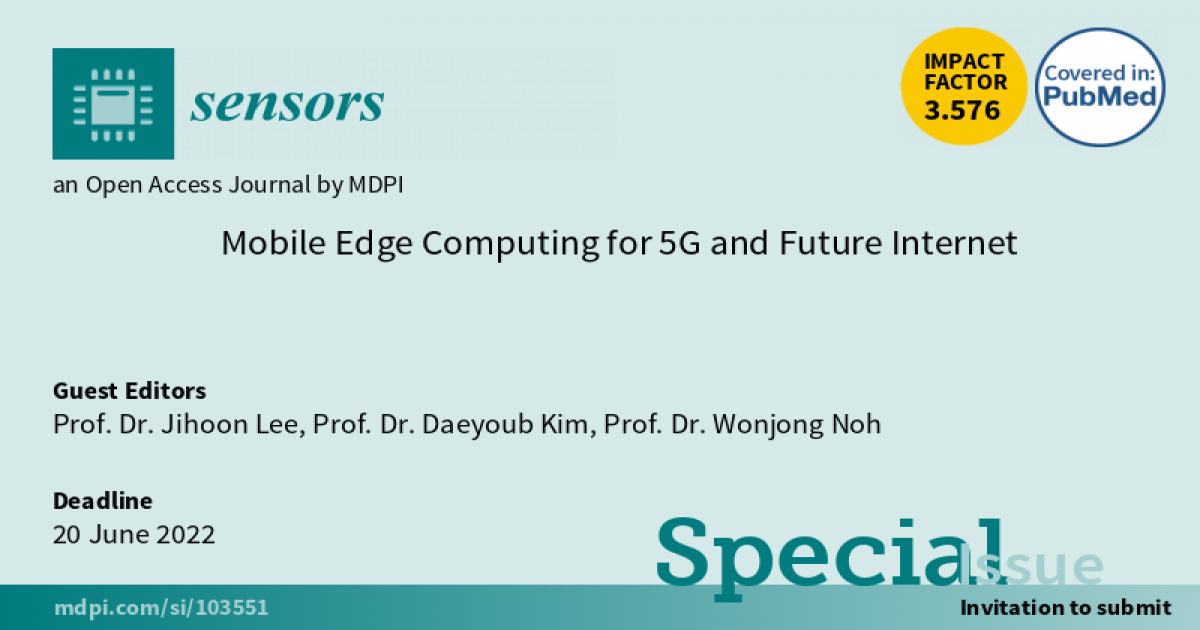Mobile Edge Computing for 5G and Future Internet
A special issue of Sensors (ISSN 1424-8220). This special issue belongs to the section "Communications".
Deadline for manuscript submissions: closed (20 June 2022) | Viewed by 6853

Special Issue Editors
Interests: wireless networks; future internet; mobile-oriented information-centric networking; virtual reality (VR) streaming; mobile edge computing (MEC); network security; secure M2M; software-defined networking
Special Issues, Collections and Topics in MDPI journals
Interests: secure edge computing; future internet security; ML-based security
Special Issues, Collections and Topics in MDPI journals
Interests: network capacity; network optimization; stochastic QoS guarantee; machine learning; information theory
Special Issues, Collections and Topics in MDPI journals
Special Issue Information
Dear Colleagues,
At present, the service and communication paradigms are rapidly changing from simple applications to various intelligent multimedia applications such as immersive VR/AR contents as well as from cellular and WiFi based networks to heterogeneous networks including all-IP, device-to-device, and Internet of Things (IoTs). With such big changes, interest in 5G and edge computing is increasing. Edge computing is a technology that reduces transmission delays and bandwidth constraints by placing resources such as computing, memory, bandwidth, and applications on a network close to the user. That is, edge computing, can process data on user devices such as smartphones, and can support mobile computing and IoT technologies by providing distributed processing performance as a distributed open architecture. This Special issue “Mobile Edge Computing for 5G and Future Internet” aims (i) the recent developments in distributed control and schems for edge computing in 5G environment, and (ii) the analysis of critical issues and proposals for the interworking with future internet technologies.
Prof. Dr. Jihoon Lee
Prof. Dr. Daeyoub Kim
Prof. Dr. Wonjong Noh
Guest Editors
Manuscript Submission Information
Manuscripts should be submitted online at www.mdpi.com by registering and logging in to this website. Once you are registered, click here to go to the submission form. Manuscripts can be submitted until the deadline. All submissions that pass pre-check are peer-reviewed. Accepted papers will be published continuously in the journal (as soon as accepted) and will be listed together on the special issue website. Research articles, review articles as well as short communications are invited. For planned papers, a title and short abstract (about 250 words) can be sent to the Editorial Office for assessment.
Submitted manuscripts should not have been published previously, nor be under consideration for publication elsewhere (except conference proceedings papers). All manuscripts are thoroughly refereed through a single-blind peer-review process. A guide for authors and other relevant information for submission of manuscripts is available on the Instructions for Authors page. Sensors is an international peer-reviewed open access semimonthly journal published by MDPI.
Please visit the Instructions for Authors page before submitting a manuscript. The Article Processing Charge (APC) for publication in this open access journal is 2600 CHF (Swiss Francs). Submitted papers should be well formatted and use good English. Authors may use MDPI's English editing service prior to publication or during author revisions.
Keywords
- intelligent edge computing
- cooperated mobility management
- distributed content migration
- secure edge computing
- vehicular edge computing
- network slicing
- mobility-aware edge computing
Benefits of Publishing in a Special Issue
- Ease of navigation: Grouping papers by topic helps scholars navigate broad scope journals more efficiently.
- Greater discoverability: Special Issues support the reach and impact of scientific research. Articles in Special Issues are more discoverable and cited more frequently.
- Expansion of research network: Special Issues facilitate connections among authors, fostering scientific collaborations.
- External promotion: Articles in Special Issues are often promoted through the journal's social media, increasing their visibility.
- Reprint: MDPI Books provides the opportunity to republish successful Special Issues in book format, both online and in print.
Further information on MDPI's Special Issue policies can be found here.








